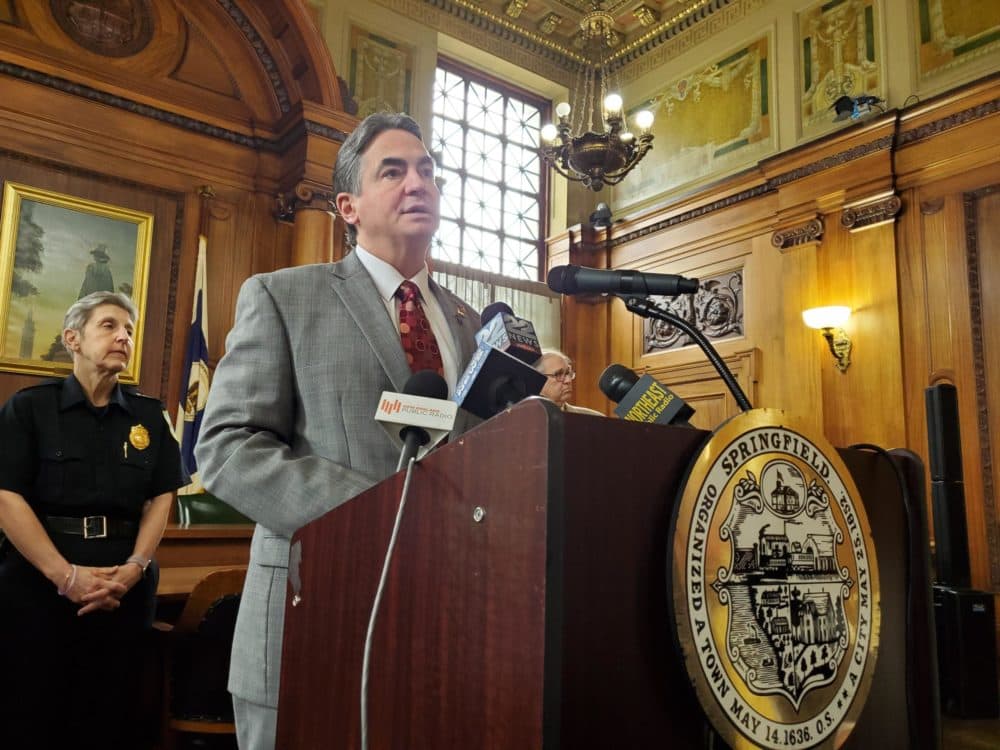Advertisement
Headed To Court: Who Controls The Police In Springfield?

A hearing will be held on Tuesday in Hampden Superior Court on the City Council's lawsuit against Springfield Mayor Domenic Sarno.
The council has twice passed ordinances changing the leadership structure of the police department — only to have the mayor ignore the measure each time. The disagreement centers on who should control what the ACLU of Massachusetts has called “one of the worst police departments in the country.”
Springfield has paid millions to settle police brutality and misconduct claims in recent years. Officers have faced criminal indictments for their actions — more than a few caught on video. And the U.S. Justice Department has released a scathing report about the department's narcotics division.
So when protests for racial justice arrived in Springfield last year, activists and politicians already had one big item on their list of demands: civilian control of the police.
In June, then-City Council President Justin Hurst spoke at a rally in a parking lot where — prosecutors say — in 2015, off-duty police officers beat up four Black men, and on-duty officers covered it up.
"What happened to Mr. Floyd on the streets of Minneapolis came dangerously close to happening right here in this parking lot," Hurst said to the crowd.
The protests last summer added a sense of urgency to a fight over control of the police department that goes back years.
'That Can't Be Right'
Springfield had a commission overseeing the police until 2005, when a state-imposed control board decided a single commissioner should be in charge. Through the years, some city councilors tried to reestablish the commission, and in 2016, the council voted to do just that. Mayor Sarno vetoed the measure, saying it went against the city charter. The council overrode the veto, but the mayor didn't take any action.
The same situation played out in 2018 when the council passed a similar law. And by 2020, the council had enough. In late September, it voted to authorize legal action. The council had taken on pro bono legal counsel earlier in 2020 to review its options.
“The charter is clear. They can reorganize. They can abolish. They can reassign. They have broad power with regards to the police department,” said Tom Lesser, one of two attorneys representing the City Council.
Lesser said if Sarno thought the ordinance was against the law, he should have taken his own legal action, instead of doing nothing. He said Sarno's inaction left the council no choice but to sue.
“Or else, any ordinance they pass in the future would be of questionable validity. The mayor could simply ignore it,” Lesser said. “That can’t be right.”
'We Are Following The Letter Of The Law'
As for Sarno, Michael Angelini, one of the outside lawyers representing the mayor, declined comment for this story — saying it would be inappropriate before the hearing. And the mayor's spokesman did not respond to a request for comment.
But back in June, when the council was considering its legal options, Sarno was asked about the situation.
“It’s a shame that a legislative body is going to sue another — the executive body here in the city,” Sarno said. “But that’s why City Solicitor [Ed] Pikula and our law department, we are following the letter of the law.”
Sarno's lawyers argue the ordinance is "invalid and unenforceable" because it would interfere with the mayor's powers to hire and fire department heads, as spelled out in the charter.
Lesser disagreed, saying the ordinance gives the mayor the power to appoint members to the commission — albeit with some restrictions.
In their court filing, the mayor's lawyers struck a defiant tone.
“If the citizens of Springfield disagree with Sarno’s decision, they can elect his replacement,” the attorneys wrote. “Any one of the City Councilors who wishes to make that decision in place of Mayor Sarno can put his or her name on the ballot.”
Decision Could Set Precedent
In this power struggle, there are two very different interpretations of the Springfield city charter. The arguments will play out in court starting Tuesday, and local leaders elsewhere grappling with police issues should pay close attention to what happens.
“City council people are receiving pressure for police reform from their constituents, and they’re discovering their lack, basically, of power to institute some of these reforms,” said Janice Griffith, a law professor at Suffolk University who specializes in state and local government law.
Griffith said the Springfield case could be precedent-setting.
“It would be a very interesting case. And the precedent that it would establish would certainly not only resonate in Massachusetts,” Griffith said. “It might even be examined by jurisdictions in other states.”
The two sides are looking for a summary judgement, which would mean a judge would render a decision in a quicker fashion than a full trial. Still, in a fight with this many years behind it, appeals to higher state courts are certainly possible.
Ben James contributed.
This story is a production of New England News Collaborative. It was originally published by New England Public Media on Jan. 18, 2020.